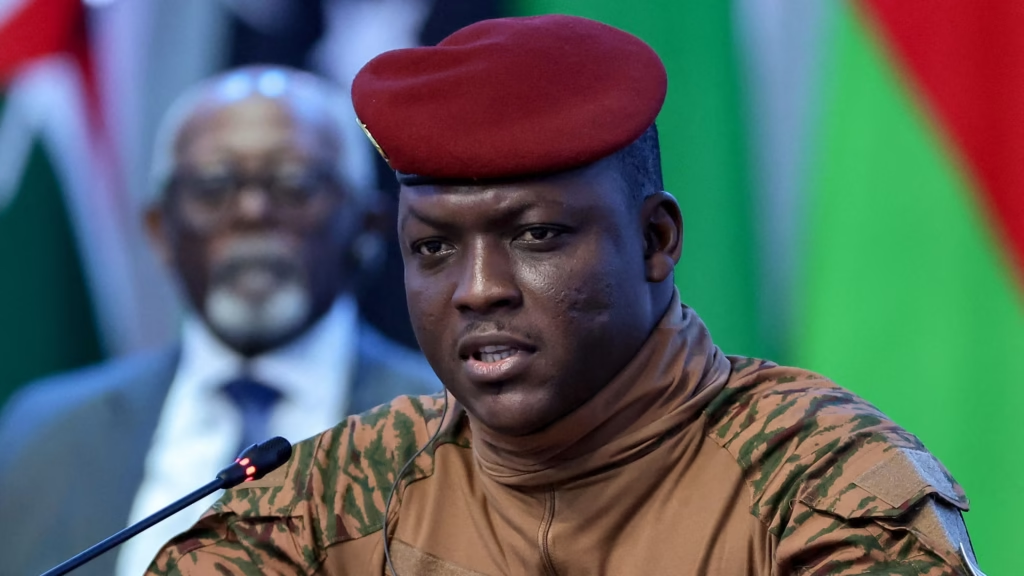Captain Ibrahim Traoré, the interim leader of Burkina Faso, rose to power following a coup in September 2022 against Lieutenant Colonel Paul Henri Damiba. At just 37 years old, Traoré has become a central figure in West African politics, steering Burkina Faso through significant regional shifts, including the country’s withdrawal from the Economic Community of West African States (ECOWAS). Alongside Niger and Mali, Burkina Faso has formed the Alliance of Sahel States, signaling a new era of regional alignment. But where is Burkina Faso headed under Traoré’s leadership?
Who is Captain Ibrahim Traoré?
Born in 1988 in Bondokuy, a small town in Burkina Faso, Traoré completed his secondary education in Bobo Dioulasso before studying at the University of Ouagadougou. He joined the army in 2010, graduating as a second lieutenant from the Georges Namoano Military Academy in 2012.
Traoré’s military career includes serving as a peacekeeper in the United Nations Multidimensional Integrated Stabilization Mission in Mali (MINUSMA) and leading counterterrorism missions in northern Burkina Faso. Promoted to captain in 2020, he played a key role in the January 2022 coup that ousted former President Roch Marc Kaboré.
Traoré’s Rise to Power
Traoré’s ascent to leadership came amid growing dissatisfaction with Damiba’s rule. In September 2022, Traoré and a group of junior officers orchestrated a coup, capitalizing on public and military outrage following a deadly ambush that killed 11 soldiers and dozens of civilians.
Since taking power, Traoré has positioned himself as a reformer, drawing comparisons to Captain Thomas Sankara, Burkina Faso’s revolutionary leader in the 1980s. However, Traoré’s rule has been marked by instability, with multiple alleged coup attempts and a fragmented military.
To understand the legacy of Thomas Sankara, explore Al Jazeera’s Sankara Profile.
Public and International Response
While some media reports suggest Traoré enjoys popular support, his regime has faced criticism for violent repression of dissent. Journalists, civil society leaders, and political opponents have been targeted, and forced conscription into the Volunteers for the Defence of the Homeland has sparked controversy.
Internationally, Traoré’s anti-French rhetoric has aligned Burkina Faso with Russian interests. Following the withdrawal of French forces, Russian mercenaries from the Wagner Group have reportedly provided security for Traoré’s regime. However, their presence has raised concerns about regime security rather than national stability.
For insights into Russia’s influence in Africa, visit the Council on Foreign Relations: Russia in Africa.
Security Challenges Under Traoré
Since Traoré took power, Burkina Faso has faced escalating violence from militant Islamist groups. Data shows a 20% increase in violent events linked to these groups, with fatalities nearly doubling from 3,621 in 2022 to 6,389 in 2024. The conflict has displaced an estimated 3 million people, over 10% of the population, and disrupted education for over a million students.
Despite Traoré’s efforts to restructure the military and redirect resources toward defense, the security situation remains dire. Civilian fatalities linked to military operations have also risen, further complicating the humanitarian crisis.
For updates on the humanitarian situation, visit UNHCR Burkina Faso.
What Does the Future Hold?
Traoré’s leadership has not yet delivered the stability or security Burkina Faso desperately needs. With ongoing violence, alleged coup attempts, and a growing humanitarian crisis, the country’s future remains uncertain.
The military’s dominance in politics, coupled with the spread of militant Islamist insurgency, paints a bleak picture. However, Traoré’s efforts to forge regional alliances and reduce foreign influence could reshape Burkina Faso’s geopolitical landscape.
Call to Action: Stay Informed and Advocate for Change
The situation in Burkina Faso underscores the importance of global awareness and advocacy. Here’s how you can help:
- Stay Informed: Follow trusted news sources for updates on Burkina Faso.
- Support Humanitarian Efforts: Donate to organizations aiding displaced communities.
- Advocate for Peace: Raise awareness about the crisis and urge international action.
For more information on how to support Burkina Faso, visit Amnesty International Burkina Faso.



